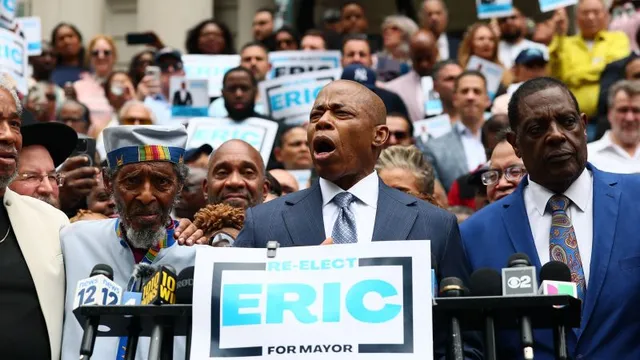
Eric Adams announces reelection campaign amid challenges from socialists
2025-06-27 04:18- Zohran Mamdani, a democratic socialist, emerged victorious in the Democratic primary, defeating Andrew Cuomo.
- Eric Adams announced his campaign for reelection as an independent, contrasting his record with Mamdani's proposals.
- The general election is expected to feature a distinct ideological battle between Adams's moderate stance and Mamdani's progressive agenda.
Express your sentiment!
Insights
In the United States, specifically New York City, Mayor Eric Adams announced his reelection campaign on June 26, 2025, from the steps of City Hall. This announcement came after a notable upset in the Democratic primary where Zohran Mamdani, a self-proclaimed democratic socialist, defeated former Governor Andrew Cuomo. Adams, who had been elected as a Democrat in 2021, opted to run as an independent candidate in response to his low approval ratings and ongoing controversies involving corruption allegations that had recently been dismissed. With Mamdani securing a significant lead among Democratic nominees, Adams seeks to position himself against both Mamdani and the Republican candidate, Curtis Sliwa, as he campaigns for a second term while emphasizing his record in public safety, job creation, and housing security. Adams's reelection bid is set against a backdrop of a changing political landscape in New York City. The primary elections were characterized by record voter turnout and Mamdani’s underdog victory reflects a shift toward more progressive policies that resonate with younger voters. Mamdani’s campaign highlights issues such as free public transportation, rent-freezes, and broader social accessibility, which Adams firmly opposes, warning that such proposals threaten to undermine the city’s progress made under his leadership. He attempted to draw distinctions between his experiences as a police captain and state senator, compared to Mamdani's privileged background. In his campaign launch, Adams asserted, "This is a city not of socialism," criticizing Mamdani's vision as unrealistic and anti-business. He referred to Mamdani as a
Contexts
The impact of party affiliation on New York City elections is a critical aspect of the city’s political landscape. In a city characterized by its diverse population and complex socio-economic issues, party allegiance often influences voting behavior, candidate selection, and policy priorities. Historically, New York City has been a bastion of Democratic power, with a significantly larger number of registered Democrats compared to Republicans. This dominance influences not only the overall election outcomes but also the political culture of the city. Democratic candidates have typically outperformed their Republican counterparts in local, state, and federal elections, which underscores the importance of understanding party affiliation in shaping electoral strategies and voter engagement initiatives. Voter registration data in New York City illustrates the stark reality of party affiliation's impact on elections. With over 5 million registered voters, Democrats account for approximately 50% of the electorate, while Republicans make up around 15%, and independents or third-party members fill the remaining percentage. This imbalance leads to a hyper-competitive Democratic primary process, where candidates often vie for the same voter base, raising the stakes for issue differentiation and grassroots mobilization. Additionally, the trends in party registration are reflected in election outcomes, where Democratic candidates have maintained their hold on key offices, including the mayoralty, city council seats, and congressional districts. The polarization witnessed in recent years has further emphasized the role of party affiliation. As national trends influence local politics, ideological divides within parties can lead to increased competition among candidates of the same party, often revolving around progressive versus moderate viewpoints. This has prompted parties to adjust their platforms and campaign strategies to engage the electorate effectively. Moreover, the increasing number of voters identifying as independents complicates traditional party dynamics, pushing candidate focus toward issue-driven campaigning rather than strict party loyalty. The impact of social movements, especially those concerned with racial and economic justice, has necessitated a reevaluation of what party loyalty means in the context of voter motivations. The implications of party affiliation on policy and governance in New York City are profound. Elected officials from the predominant Democratic party often prioritize issues including affordable housing, educational reform, and social equity, reflecting the urban electorate's needs and concerns. However, the challenge remains in addressing the diverse opinions within the party and the ever-growing independent voter demographic. Policymaking is heavily influenced by the need to cater to a broad constituency, which requires an understanding of not only party lines but also the intersections of class, race, and social justice. Moving forward, the significance of party affiliation in New York City elections will likely continue to evolve, necessitating continuous analysis to understand the dynamics at play and the potential for shifts in future electoral patterns.